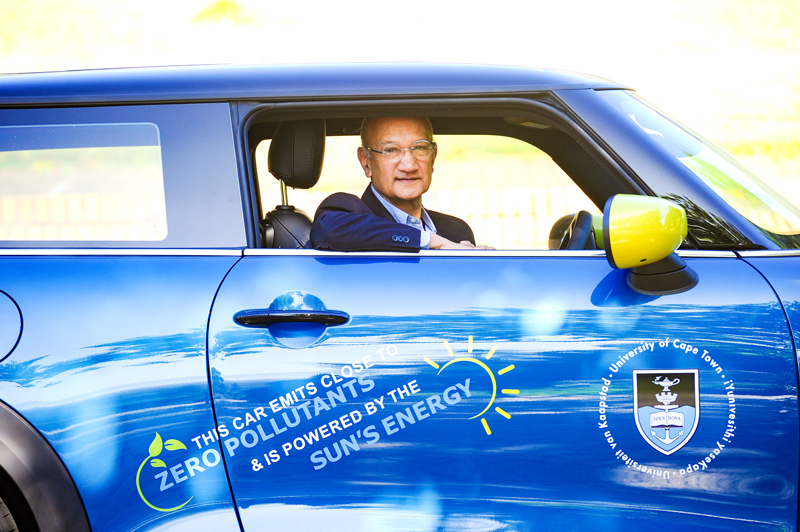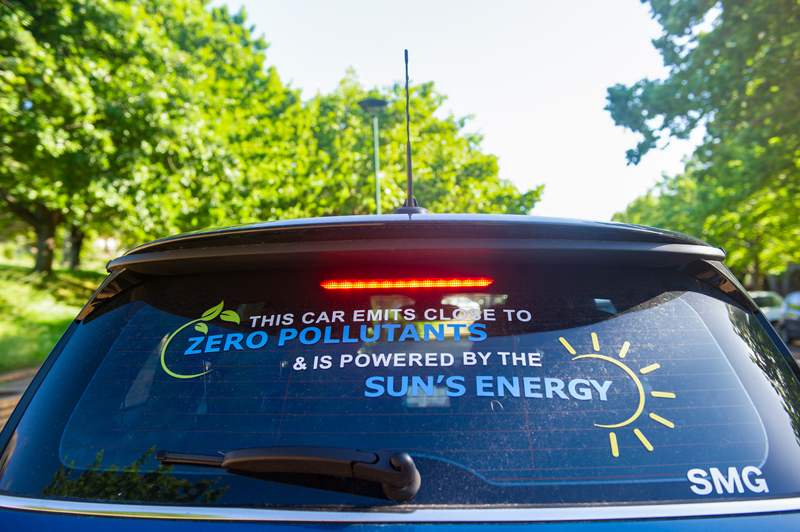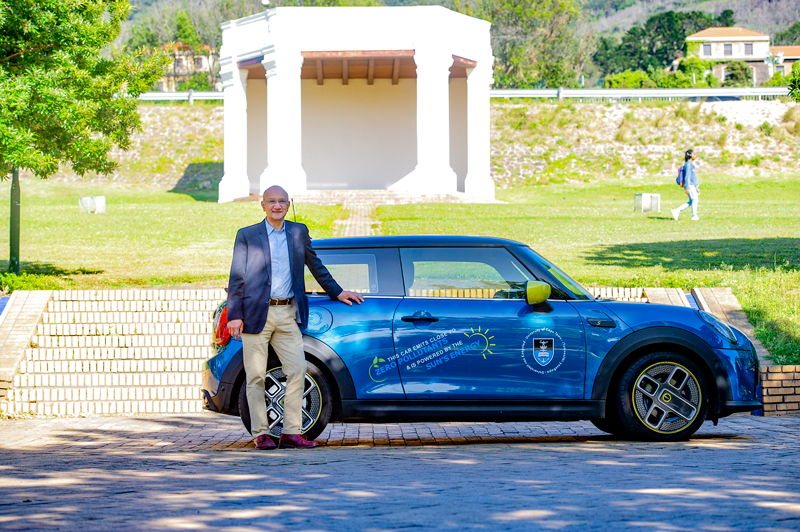Zippy and exhilarating: Test driving UCT’s electric vehicle
22 November 2023 | Story Kamva Somdyala. Photos Lerato Maduna. Read time 6 min.
The University of Cape Town’s (UCT) Mini Cooper sustainability electric vehicle (EV) recently landed in the hands of Vice-Chancellor interim Emeritus Professor Daya Reddy as part of an experiential project by the university’s Environmental Sustainability Directorate.
It was Emeritus Professor Reddy’s first time in the electric vehicle; however, some of his colleagues in management have also had an opportunity to drive the branded car as an exploration of UCT’s sustainability endeavours.
“I enjoyed it very much – the quiet in particular – but also the zippiness of the vehicle. I also like the way in which the vehicle brakes automatically when one removes one’s foot from the accelerator. My next car may well be an electric one,” Reddy said.
This very same breaking charges the vehicle’s battery through what is called regenerative breaking.

“The car conveys to the university community and beyond UCT’s commitment to sustainable solutions to its energy needs. UCT must signal its commitment to sustainability across its academic activities and operations, and I see the electric vehicle as one such commitment,” said Reddy.
Manfred Braune, UCT’s director of Environmental Sustainability in the Office of the Vice-Chancellor, said while the growth of EVs globally has been significant, South Africa is still slow.
“This first is because of their high purchase price. The second is high import duties [and] the third is our national electricity grid not being reliable. One reason that is less considered is the fact that our electricity grid is one of the dirtiest in the world, mostly coming from coal power. The EV market and infrastructure is as a result not very well established in South Africa,” Braune noted.
“This project explores issues of sustainability, both environmental and financial.”
With the university experimenting with the use and operation of EVs in different UCT contexts, it comes with several benefits. “It is an opportunity to explore and experiment with new technology in the South African context on our campus, including [collecting] first-hand data and the opportunity to use this data in research that supports the notion of UCT’s campus becoming a ‘living lab’ for sustainability.”
Braune continued: “Many times people would stop us and ask us about the car to find out more because of the branding and because they are intrigued and interested. This is a wonderful opportunity to grow awareness about EVs and solar charging to support EVs.
“This project explores issues of sustainability, both environmental and financial, to consider how and when it would make sense for UCT to incorporate EVs into its vehicle fleet, while also socialising UCT leadership to the use of EVs on campus and beyond.”
He added: “UCT would also need to consider how much solar power is needed for a portion of the vehicle fleet to be EVs that are charged from solar power. In this experiment, the electric vehicle is charged only at UCT locations where we have solar PV [photovoltaic], to start exploring this principle.
“UCT has done a detailed technical feasibility study of the possibility of changing the UCT Shuttle to an EV fleet, which is not deemed feasible at the moment for financial, environmental and technical reasons, so we will continue to watch this space closely in respect of the bus market as well.”
Takes corners fast

Deputy Vice-Chancellor (DVC) for Transformation, Student Affairs and Social Responsiveness Professor Elelwani Ramugondo also had the chance to test drive the car.
She described the experience as “exhilarating”.
“The vehicle takes off, overtakes, and takes corners fast; renewing energy as one drives was particularly exciting. Running out of car battery power while far away from a charging station was often a nagging fear. Charging an EV entirely on solar energy is not only cost-effective, but a poignant way to show how we harness solar power to reduce dependency on fossil fuel. Driving the Cape Town scenic routes felt like being in a car advert.”
“It is a fine example of how daily work-to-home commutes can be done with reduced carbon emissions.”
The vehicle also recently went on a sustainability outreach programme with students of Professor David Oyedokun from the Department of Electrical Engineering. Professor Oyedokun said it was “a fine example of how daily work-to-home commutes can be done with reduced carbon emissions while contributing to building a sustainable world”.
For the high school students who benefitted from the show-and-tell of the vehicle, he observed that it “presented an opportunity for the learners to see and experience a complex electrical engineering system which is powered by batteries”.
- allow UCT to more appropriately make decisions about how the university might in future use and operate EVs in its own vehicle fleet
- allow UCT (and students) to gather data and undertake research on EVs and EV charging stations, as well as EV driver experiences
- allow UCT to test and explore EV charger cost recovery methods, which are not well established in South Africa, that will inform UCT’s approach to future EV charging stations on campus.
 This work is licensed under a Creative Commons Attribution-NoDerivatives 4.0 International License.
This work is licensed under a Creative Commons Attribution-NoDerivatives 4.0 International License.
Please view the republishing articles page for more information.










